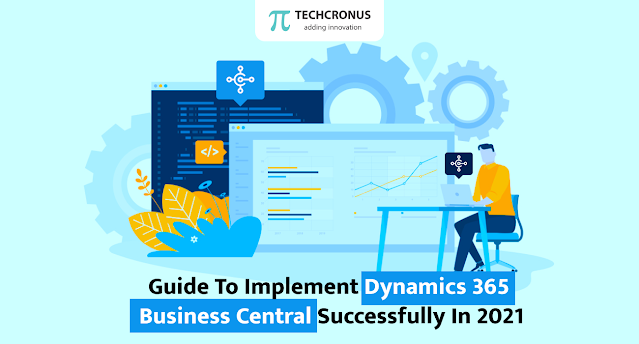Guide To Implement Dynamics 365 Business Central Successfully In 2021
For the past many years, Microsoft’s Dynamics 365 Business Central has proven its mettle in streamlining operations and enhancing organizational productivity. Implementing it can prove a huge step in jump-starting your company’s digital transformation when well planned and executed systematically. Dynamics 365 Business Central extends a rich collection of features, the ability to seamlessly integrate with other applications, and a unified user experience. However, to realize your full potential, it needs to be customized to your business model. Let us give you a broad overview that will help you select a vendor (Microsoft Partner) to aptly implement Dynamics 365 Business Central.
Evaluation Of Your Business Needs
Ideally, you should kick off by sitting down with your company’s PPC team, core competency executives, and Dynamics 365 implementation partner for free-flowing exchange of ideas among them. Deploying a modern ERP system is a collaborative process. Your team and Microsoft implementation partner will need to put in cohesive efforts. These meetings should discuss current business activities to evaluate how each of your business activities and core competencies can be enhanced by implementing Dynamics 365 Business Central. It should also give you a rough idea of how Dynamics 365 Business Central can help you manage your finances more efficiently, increase sales and streamline your business processes.
Deploy And Activate Business Central Environment
Before deploying the Business Central environment on a computer, the vendor will need to get rid of any previous system or previous versions of Business Central. Your implementation partner will need to make sure all the modules and components belong to the same version and build of Business Central. If you have SQL Server or MSDE installed on the computer where you are planning to install Business Central, it must be uninstalled first. Once the requirements mentioned earlier are met, your Business Central implementation vendor can pre-configure components and install different components on different computers as required. After completing the installation, your partner will restart all computers and activate the license. Make sure they review the license file after uploading and verify that all the information is correct.
Assign Security Rights For Dynamics 365 Users
After installation and activation, your ERP implementation vendor will create a user account that needs to be registered with the Microsoft Online Service environment. They will also assign your system administrator as the service administrator role in the Microsoft Online Services environment. It automatically grants the user as the System Administrator security role in Dynamics 365. Similarly, implementation partners will also assign deep, local, and basic security rights to other users according to their role.
Train User And IS Administrator
Your system is deployed and activated as it should be, user rights are also assigned exactly as your business demands, but the success of any system is defined by people who run them. If your staff is not trained adequately or adopts it fully, then you can’t expect any system to give spectacular results. Your implementation partner should focus on getting results through extensive training. Take feedback from your staff periodically, and don’t shy away from asking for additional help as your success ultimately depends on the quality of your staff’s expertise.
Load Data / Create Production Database
You can create many different types of environments based on your specific needs. For instance, you can create a production environment for training or create a sandbox environment based on production data. By using sandbox instances, you can safely develop and test application changes with little or no risks. You can use the Business Central administration center to manage production instances manually. You can create configuration packages and save rapid start in Azure blob storage publicly and load packages from the extension you need to load data. Your implementation team will load your existing customers, vendors, and financial history to Business Central. Once done, your information system (IS) team will start the migration. After necessary data is in place, your team can start building a key performance indicator dashboard using Power BI.
Going Live
The final step in the process is to check if the installation is ready to go online by your team and implementation partner. The system should be checked thoroughly, and all the flaws should be addressed well in advance in order to avoid a shaky start. These flaws can be anything, including incompatible versions, lack of commitment from your core executives, or improper analysis of your business requirements. With the right kind of help, all the glitches can be ironed out, and end-users should not face any difficulty using Dynamics 365 Business Central as it has the familiar interface of the office app.
Summing Up
Dynamics 365 Business Central provides enterprises with a suite of diverse services to help them meet and exceed the company’s needs. Choosing an experienced and skilled ERP implementation partner is highly important as the right vendor will complete the implementation on time and within your budget with no last-minute surprises. One-size-fits-all approach vendor may not be the right choice for implementing a complex project such as Dynamics 365 Business Central. This quickstart miniguide should help find the right implementation partner as deploying an ERP system is a major and expensive decision. If you are planning to go ahead with Dynamics 365 Business Central, feel free to contact Techronus. Our team of tech experts and business process consultants will help you get the perfect solution for your business.



Comments
Post a Comment